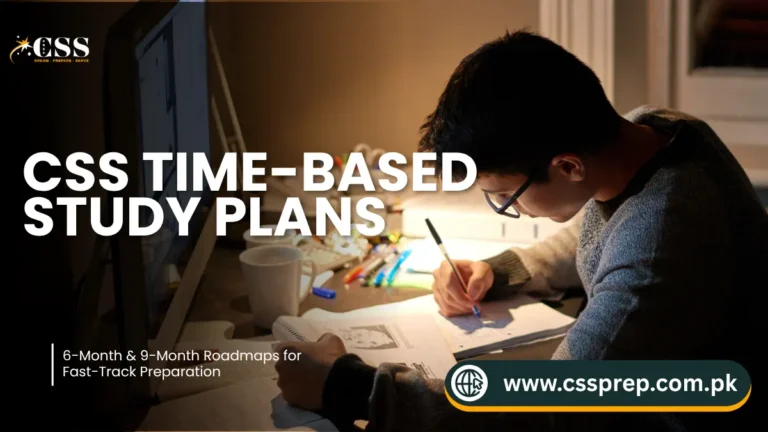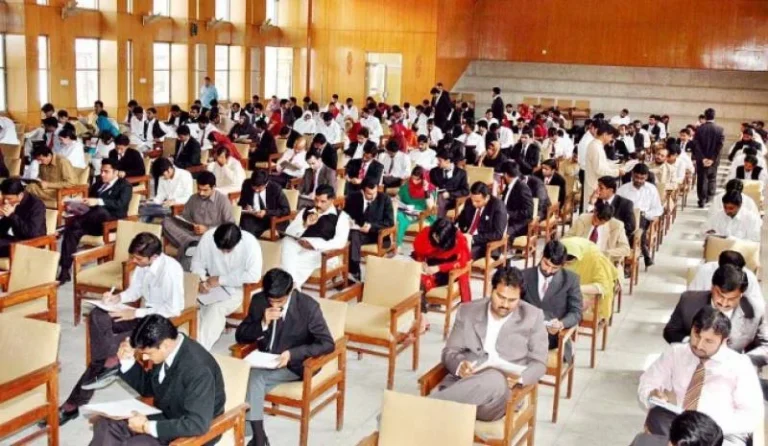Ultimate Strategy to Cover CSS Current Affairs (2026 & Beyond)
Introduction: Why Current Affairs Matter in CSS Exams
Current Affairs is often called the “make-or-break subject” in CSS exams. It doesn’t just influence the Current Affairs paper (worth 100 marks), but also impacts Essay writing, Pakistan Affairs, International Relations (IR), Interview/Viva, and several optional subjects like US History, British History, Gender Studies, and Criminology.
Yet, most aspirants struggle because they don’t have a structured approach. This guide provides a step-by-step CSS Current Affairs strategy for 2026 & beyond, helping you prepare theme-wise, year-wise, and source-wise — the exact way toppers approach it.
Why Students Struggle with CSS Current Affairs
- Relying on last-minute cramming before exams
- Collecting scattered notes from random sources
- Ignoring analytical answers and linkages to other papers
- Not following a consistent, time-bound plan
If you’re starting for CSS 2026, the earlier you begin, the better your grasp of both facts and analysis.
Step 1: Understand the Exam Requirements
Current Affairs has a direct and indirect impact across multiple papers.
| Component | Marks | Weight in Exam |
|---|---|---|
| CSS Current Affairs Paper | 100 marks | Direct questions on global & national issues |
| Impact on Essay | 100 marks | Essays often revolve around current events |
| Impact on Pakistan Affairs & IR | 100+ marks | Questions framed from ongoing issues |
| Impact on Interview (Viva) | 300 marks | Most questions are Current Affairs-based |
| Impact on History of USA & British History | 15–20 marks | 2–3 questions often relate to current US politics, foreign policy, or diplomatic shifts |
| Impact on Gender Studies | 10–15 marks | 2–3 questions relate to current gender equality, women’s rights, or international gender debates, easily covered via newspapers |
| Impact on Criminology | 10–15 marks | Questions often come from current trends in crime, cybercrime, terrorism, or justice reforms, which can only be prepared through daily news analysis |
Takeaway: Current Affairs is a score-booster across compulsory, optional, and viva stages.
Step 2: The Ultimate CSS Current Affairs Strategy (2026 & Beyond)
1. Adopt a Thematic Approach (Not Random Topics)
Instead of memorizing scattered news, focus on key recurring themes:
A. Domestic/National Issues
- Economic crisis & IMF agreements
- Elections & political developments
- Energy crisis (electricity, gas shortages)
- Water scarcity & Indus Water Treaty
- Education reforms & health challenges
B. International & Regional Issues
- Pakistan-US relations
- Pakistan-China & CPEC updates
- Pakistan-India tensions (Kashmir, LOC issues)
- Afghanistan situation post-Taliban takeover
- Pakistan’s role in the Middle East (Iran-Saudi ties, Palestine conflict)
C. Global Challenges
- Climate change & COP conferences
- Global economic recession & oil prices
- AI, cybersecurity & digital governance
- UN reforms & international law challenges
Pro Tip: Organize these topics in a Current Affairs Notebook with separate sections for each theme.
2. Year-Wise Preparation Plan
For CSS 2026 Aspirants (Starting in Oct 2025)
| Month | Focus Area | Goal |
|---|---|---|
| Oct – Nov 2025 | Build basics: Pakistan economy, politics, foreign policy | Build foundation |
| Dec 2025 – Jan 2026 | Global affairs, thematic essays, climate change | Analytical answers |
| Feb 2026 | Practice past papers, timed answer writing | Exam simulation |
Daily Routine:
- 1 hour: Read a reliable newspaper (Dawn or The News).
- 30 mins: Watch current affairs shows (Ptv News Analysis, TRT World, DW).
- 30 mins: Update notes with statistics & facts.
Weekly Routine:
- Write 2–3 answers on trending topics.
- Discuss weekly issues with peers for analytical insight.
- Newspapers: Dawn, The News, Al-Jazeera, The Economist (for global trends)
- International Magazine: Foreign Affairs (for in-depth global and regional policy analysis)
- Government & International Reports:
- Pakistan Economic Survey
- UNDP, IMF, World Bank, FAO reports
- Websites: cssprep.com.pk, CSSForum, PIDE blogs
Note: Avoid relying on local yearbooks or monthly digests; focus instead on Foreign Affairs magazine and credible international sources for fresh perspectives.
Step 3: Answer Writing Strategy for High Scores
Current Affairs answers are marked for analysis, not facts only.
Follow this 4-step structure:
- Introduction: Start with a recent event/statistic (2–3 lines)
- Analysis: Discuss causes, impacts, stakeholders
- Way Forward: Suggest practical solutions
- Conclusion: End with a hopeful, policy-driven statement
👉 Use data, quotes & diagrams to stand out.
Step 4: Common Mistakes to Avoid
❌ Rote memorization of facts without analysis
❌ Ignoring past papers’ trends
❌ Using outdated statistics
❌ Writing lengthy, unstructured answers
❌ Not linking national issues with global dynamics
Step 5: Practice with Past Papers (2016–2025)
A quick analysis shows the most repeated areas:
- Pakistan’s economic and political challenges
- Climate change and water crisis
- Pak-US, Pak-China, Pak-India relations
- Terrorism, FATF, global peace & security
👉 Practicing these topics helps predict future trends.
Step 6: Tips for Smart & Consistent Preparation
- 📌 Start with daily summaries instead of reading entire newspapers.
- 📌 Create one-pager notes for each topic for revision.
- 📌 Use charts, mind maps, and bullet points in answers.
- 📌 Dedicate 2 hours daily for Current Affairs (split between reading & writing).
- 📌 Revise monthly to keep your notes up to date.
Step 7: How This Strategy Helps Beyond Current Affairs Paper
- Essay: Provides facts, arguments, and stats for writing analytical essays.
- Pakistan Affairs: Strengthens historical context with modern relevance.
- Optional Subjects (US & British History, Gender Studies, Criminology): Keeps you updated on recent global trends and cases that often appear in papers.
- Viva/Interview: Builds confidence in discussing national and global issues.
Final Thoughts
Current Affairs is not just about knowing the news — it’s about understanding and analyzing trends that shape Pakistan and the world.
By following this theme-wise, year-wise, and practice-based strategy, you’ll be ahead of 80% of aspirants who study Current Affairs in a disorganized way.
🔥 Start early, stay consistent, and focus on quality analysis — that’s the ultimate key to scoring high in CSS Current Affairs (2026 & beyond).
⭐ Pro-Tip:
You can also prepare from our regularly updated Latest Current Affairs Blogs to stay up to date with Pakistan and global issues that frequently appear in CSS papers.







